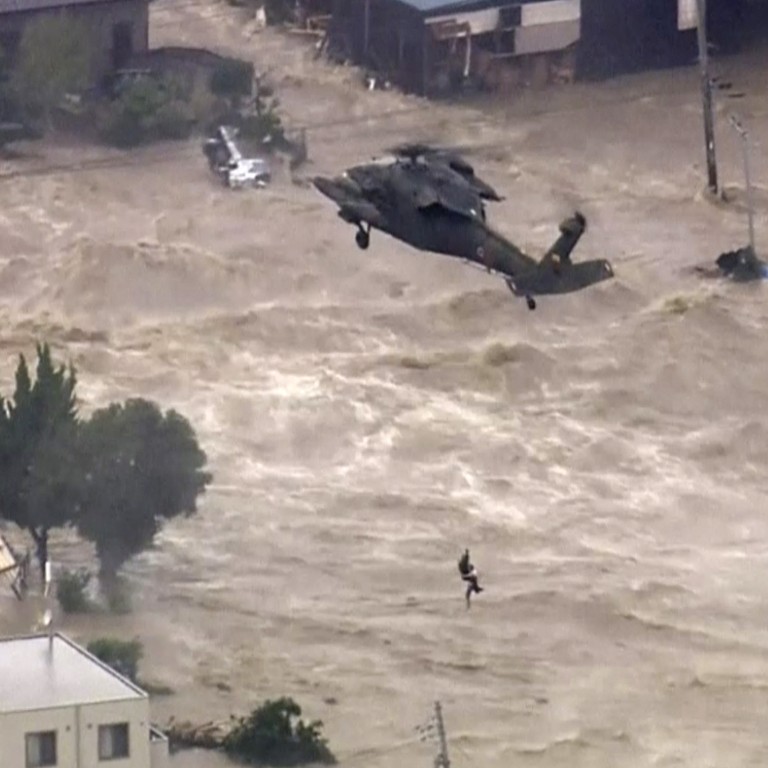
‘There was no time to escape’: As Japan reels from floods, rescuers search for missing people
Thousands forced to spend the night at evacuations centres in the city of Joso after river bursts its banks
Rescue workers searched through a flooded city near Tokyo on Friday, hunting for missing people a day after raging floodwaters broke through an embankment and washed away houses and forced dozens of people to rooftops.
Dozens of residents stranded in heavily flooded Ishige district in Joso City were airlifted by military helicopters and arrived at an athletic field in the city, carrying bare minimum of clothes and some food in shopping bags, some of them even without shoes.
City officials said 22 people lost contact after requesting rescue and were believed missing. Three others, including one seriously, were injured.
The flooding came after two days of heavy rain, with the Kinugawa River breaking through a flood berm, sending water gushing into the eastern half of Joso, a city of 60,000 people about 50 kilometres northeast of Tokyo.

Aerial videos showed a wide swath of the city underwater, more than one story deep in some places. The rains came on the heels of Tropical Storm Etau, which caused flooding and landslides elsewhere on Wednesday as it crossed central Japan.
The water had somewhat subsided as the sun came out on Friday, but the city was still largely flooded and it was not known when the evacuees would be able to return home.

Hisako Sekimoto, 62, who was airlifted by a Self Defence Force helicopter early on Friday, said she spent the sleepless night on the second floor of her flooded house with her husband and three cats. Minutes after the floodwater gushed into the house on Thursday afternoon, all of their furniture was floating and the water was up to her neck.
“There was no time to escape – all we could do was go upstairs. It was horrifying,” she said. “I kept praying the water wouldn’t come upstairs.” Live video on Japanese broadcasters showed rescuers being lowered from helicopters and clambering onto second-floor balconies to reach stranded residents.
Reiko Yamaji, 75, was stranded at a supermarket with dozens of other shoppers while she and her daughter-in-law Tomoko, 41, were buying rain boots on their way to work. Part of the first floor was submerged under water.
“We spent the night in the car parked on the rooftop parking lot. Water was cut and toilets were out of service, but I’m so glad we all survived,” Yamaji said, turning a bit teary. She said her son, who was elsewhere in the city, was rescued by a boat.

Akira Motokawa, a city evacuation official, told public broadcaster NHK that rescuers have been unable to keep up with the volume of calls for help.
A total of 3,580 people in the affected 37-square kilometre area were sheltered at schools, community centres and other safer areas. Soldiers were delivering food, blankets and water to about 780 people in several communities who were stranded but not seeking rescue.
About 400 residents had evacuated to City Hall, carrying small bags of personal items.
Yuko Kawamoto, 58, said she decided to leave her home with her 80-year-old mother after watching TV images of the water pouring out of the embankment. “It almost looked like a tsunami,” she said.

